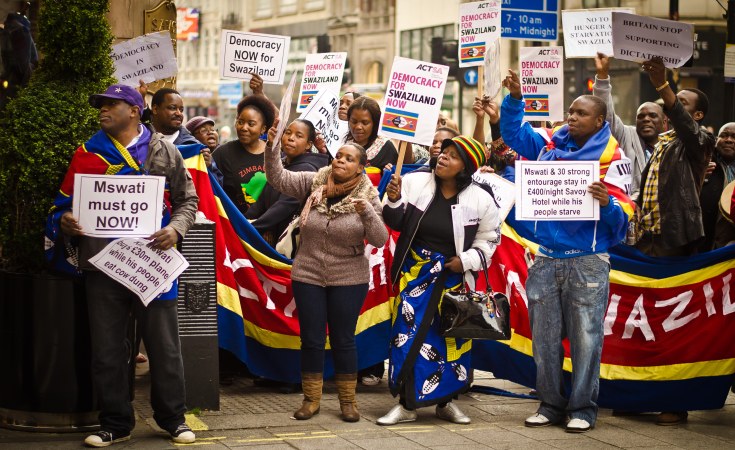London — Thulani Maseko knew speaking out in Eswatini was a risky business. An activist and well-known human rights lawyer, he'd previously spent 14 months in jail for criticising the country's lack of judicial independence. Now he's dead, shot in his home by unknown assailants.
Among those Maseko litigated against was the country's tyrannical ruler, King Mswati III. Mswati, in power since 1986, is Africa's last remaining absolute monarch. In 2018, in one indication of his unchecked power, he changed the country's name to Eswatini from Swaziland, unilaterally and without warning. Maseko was planning to take Mswati to court to challenge the renaming on constitutional grounds.
Maseko was chair of the Multi-Party Forum, a network bringing together civil society groups, political parties, businesses and others to urge a peaceful transition to multiparty democracy. He was also the lawyer of two members of parliament - Bacede Mabuza and Mthandeni Dube - arrested and detained in 2021 on terrorism charges for calling for constitutional democracy.
It isn't yet clear why Maseko was killed or whether those who did the deed were acting on their own initiative or following someone else's orders. But for many in the country's democracy movement, it's more than a little suspicious that just before the killing Mswati is reported to have said the state would 'deal with' people calling for democratic reforms. Maseko had reportedly received death threats.
Civil society is calling for Maseko's killing to be properly investigated. Those carrying out the investigation should be independent and ensure whoever is behind it is held to account, however high the trail goes. But there seems little hope of that.
Blood on the king's hands
If Maseko's killing was a reaction to his human rights work, it's an extreme form of reprisal, but it's not the only recent mysterious death. In May 2021, law student Thabani Nkomonye disappeared. When his body was discovered a few days later, it bore signs of torture. The police did little to investigate; many believed they were responsible for the killing.
When news of Nkomonye's killing broke, students protested to demand justice - and multiparty democracy, because only under democracy can state institutions be held accountable. This was the trigger for months of protests that swept Eswatini in 2021.
As protests went on some people started to target businesses owned by the monarchy. When protesters started fires, the state's response was lethal. Dozens were killed and around a thousand injured as security forces fired indiscriminately at protesters, in a shoot-to-kill policy evidently ordered by Mswati. Even if Mswati doesn't turn out to have Maseko's blood on his hands, there are plenty of other killings he's likely responsible for.
Part of a pattern?
Amid continued repression, people have little hope that the killing of Maseko will be the last, and if anything the fear is that it could mark an escalation. If the state is behind the attack, it suggests an increased boldness to its repression: it may be targeting high-profile figures in confident expectation of impunity.
There are other indications this may be the case: Penuel and Xolile Malinga of the People's United Democratic Movement, the major political party, have twice had their home fired upon in the last few months. In December 2022, human rights lawyer Maxwell Nkambule survived an apparent assassination attempt when his car was fired on.
The state signalled it had more interest in repression than investigating Maseko's killing when two protesters were shot in a march demanding justice. The danger is of growing lawlessness and further waves of state lethality in response to any protest violence.
Genuine dialogue needed
What the democracy movement is asking for is commonplace elsewhere: the right for people to have a say in the decisions that affect their lives. People want to pick the prime minister themselves, instead of the king doing it. They want to be able to vote for political parties, which are banned from elections. They want the king to be subject to the law, which requires a constitutional rather than absolute monarchy. And they want an economy that works for everyone: currently Mswati lives a life of rockstar luxury, funded through his family's direct control of key state assets, while most people live in dire poverty.
An agreement to hold a national dialogue - struck with South Africa's President Cyril Ramaphosa and the Southern African Development Community (SADC) following the 2021 protests - hasn't been honoured. Even if it happened, many doubt such dialogue would be genuine.
South Africa has a special responsibility to urge democracy, as the country that's home to Eswatini's many civil society and political exiles. It's time for South Africa and SADC to stand up to Mswati, demand genuine accountability over the killing of Maseko and push harder for real dialogue, constitutional reform and a path towards democracy.
Andrew Firmin is CIVICUS Editor-in-Chief, co-director and writer for CIVICUS Lens and co-author of the State of Civil Society Report.


